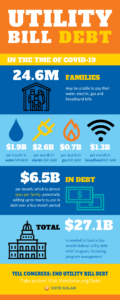COVID-19 and the Utility Bill Debt Crisis
Nearly 25 million families may be unable to pay their utility bills due to COVID-19’s economic impacts. Here’s the size of this growing crisis and what we can do about it.
COVID-19’s public health and economic crises are already impacting our everyday lives: Since mid-March, 26 million U.S. households have lost their jobs, and over 30 percent of households were not able to pay their rent in April 2020 due to economic disruption. As families are encouraged to shelter in place, access to fundamental utilities like electricity, gas, water, and broadband are more critical than ever, but also less affordable.
In this report published July 1, COVID-19 and the Utility Bill Debt Crisis, Vote Solar projects that the economic devastation of the coronavirus pandemic will plunge 20% of families into utility bill debt over the next four months as layoffs and other economic losses continue throughout the country. The average household pays more than $250 per month for critical utilities, and over a four month period of non-payment average household debt to utilities would mount to almost $1,100. This amounts to $26 billion in total utility bill debt over four months.
INFOGRAPHIC:
The Mounting Crisis of Utility Bill Debt »
We’re calling for an immediate end to all shut-offs through the end of shelter-in-place orders, and federal stimulus funding for a national program to eliminate utility bill debt caused by the pandemic, at an estimate of $27.1 billion, including costs to administer the program.
However, utility bill debt and affordability have burdened low-income and environmental justice communities well before the pandemic. Vote Solar is also advocating for long-term solutions including:
- Utility data reporting on customer arrearages and deferred disconnections
- Innovative arrearage management plans, set according to customers’ ability to pay
- Targeted, effective demand-side management programs for low-income households
- Clean energy programs like rooftop and community solar that reduce bills in the long term and address the causes of high utility burdens
Now is the time to ensure we rebuild better, with affordable utility access and a clean slate for those in need. A coronavirus economic recovery strategy that invests in clean energy will help lower electric bills for all customers, making our most vulnerable communities more resilient to economic crises while creating jobs, driving local economic investment and improving public health.
 Download the Full Report
Download the Full Report
Infographic: The Mounting Crisis of Utility Debt


